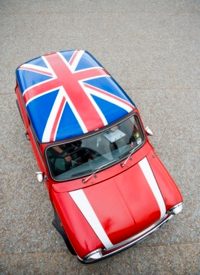
Royston, writes the Daily Mail, “has become the first [town] in Britain to have every car passing through it tracked by police cameras,” with “a set of police cameras installed on every road leading in and out of it, recording the number plate of every vehicle that passes them.”
The devices are known as Automated Number Plate Recognition (ANPR) cameras. They are tied into a London database and will alert police if a vehicle “is untaxed, uninsured, suspected of involvement in a crime, or appears on a local or national police ‘hotlist,’” the Guardian reports. Police can use this information, which will remain on their records for up to five years, to track the movements of cars throughout the country.
Best of all, from the bobbies’ perspective, “ANPR has never been the subject of parliamentary legislation, oversight or debate,” says the Guardian. As a result, “each [police] force can effectively choose its own policy” for adding license plates to the hotlist. As Guy Herbert of the civil liberties group NO2ID put it, “There’s no way to regulate how they use ANPR, they are the authority on it and they have their own rules.”
One might expect (though still deplore) such surveillance in London or another high-crime area. Royston, however, is a town of 15,000 people with a crime rate so low that the Royston Neighborhood Panel recently “decided that the local top priority of speeding should be replaced by shoplifting,” according to the Mail.
However, according to Inspector Andy Piper, ANPR manager for the region including Royston, “The local district council and local business group funded the cameras to help protect their businesses and local residents from crime.”
Civil libertarians vocally oppose the use of ANPR, especially in such a widespread, secretive fashion. Herbert, for instance, called the Royston approach “sinister and quite creepy,” adding, “There’s no way to protect people’s privacy.”
Charles Farrier of the group No CCTV “accused the police of creating a UK-wide tracking grid ‘to keep tabs on everyone’ after ANPR released details of its hopes to combine with Scottish police and other national security bureaus,” according to the Royston Weekly News.
David Hamilton of the appropriately named Big Brother Watch told the Telegraph, “Logging the movements of tens of thousands of innocent people living in the area is grossly disproportionate to the crime fighting abilities of the system and an abhorrent invasion of people’s privacy.”
Even former Royston Mayor Rod Kennedy had harsh words for the surveillance cameras: “I just feel that we are on this slippery slope where everything we do will be monitored. I don’t see why the honest citizen in a rural area such as this should have their movements tracked.”
The police, to no one’s great surprise, take the opposite tack, maintaining that ANPR has helped solve crimes and that, as the Guardian put it, “innocent motorists have nothing to fear.” Contrary to James Welch of the group Liberty, who argued that “while there may be crime detection gains, potential for abuse is great,” Piper “insists that the system will not be abused,” the Mail says.
“We only deal with people that we’re interested in stopping — that’s the criminal element that comes into our county intent on committing crime, and unsafe drivers, disqualified drivers, or people driving uninsured vehicles, who we want to take off the road,” Piper told the Guardian.
“When we look at the bigger picture in terms of Hertfordshire, as well as nationally,” he added in comments to the Telegraph, “the position of the cameras makes a lot of sense strategically to target those criminals travelling into the county on the main roads in that area — not to mention counter-terrorism.”
Ah, yes. Terrorism, the all-purpose justification for every restriction of civil liberties over the past decade — and probably longer in Britain. John Dean, national ANPR coordinator for the Association of Chief Police Officers, also cited fighting terrorism as one of the many benefits of the “brilliant tool” known as ANPR. In fact, going Piper one better, he stated, “Disclosing the locations of cameras could be a serious threat to national security.” In other words, all those folks concerned about losing their liberties to their own government had better just suck it up if they don’t want to be blown up by people who supposedly want to deprive them of those selfsame liberties.
What do the people of Royston think about all this? While the Mail reports that “residents believe the unmarked cameras are an invasion of their privacy,” the Telegraph notes that “police claim … that nine in 10 residents surveyed in Royston said they supported the use of ANPR.” If the cops’ claim is true (one wonders how the survey questions were phrased), it neatly illustrates the dangers of democracy: Ninety percent of the population could easily vote away the privacy rights of the other 10 percent.
For those who cherish liberty, the rights of Englishmen — and humans in general — should not be subject to the whims of the mob. Roystonians, whether they agree with the use of hidden cameras or not, ought to see to it that Big Brother is sent to his room and never allowed to come out again.



